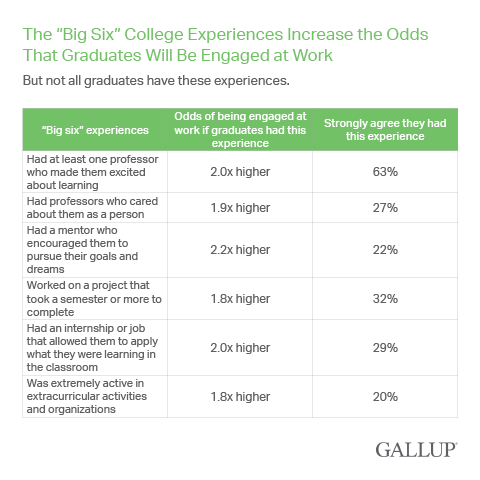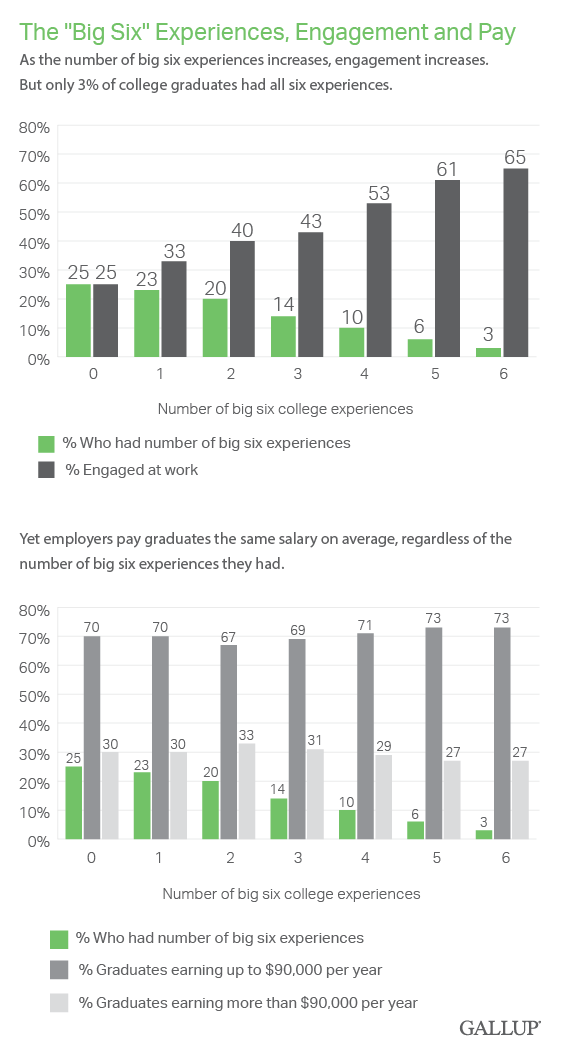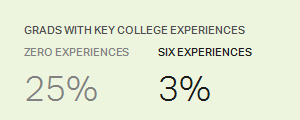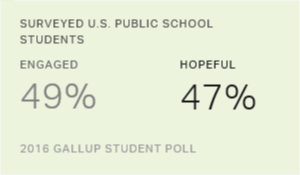Story Highlights
- Not all college graduates had high-quality college experiences
- Key college experiences link to workplace engagement
- Time to look beyond grades, test scores and resumes
Most employers hiring college graduates take it for granted that these candidates are more qualified than other potential employees who don't have a degree. Many job postings emphasize a college degree as a requirement for a position. And there is long-standing evidence that people with college degrees make more money over their lifetime than those without a degree.
Employers make a lot of assumptions about the value of a degree. But do they really know how to assess the quality of graduates' college experiences -- or how those experiences influence how prepared these graduates are to be engaged, productive employees?
Graduates' Current Work Engagement Linked to Key College Experiences
Decades of Gallup research have demonstrated that engaged employees are more productive, are less likely to be absent, have lower turnover, have fewer safety incidents and are more productive and profitable. And findings from the Gallup-Purdue Index, now the Gallup Alumni Survey -- a study of more than 30,000 college graduates -- reveal some surprising connections between the experiences students have in college and whether they are engaged in their work after college. Graduates who hit the mark on six key collegiate experiences identified in the Gallup-Purdue Index -- the "big six" -- are about three times more likely to be engaged in their work compared with graduates who missed the mark on all six.

Though college graduates met the academic requirements necessary to receive a diploma, when it comes to the big six, Gallup has found wide variation in the quality of the undergraduate experience. There are also considerable differences in how graduates fare in their engagement after they enter the workplace. Though we don't know whether the big six college experiences cause graduates to be engaged, there is nonetheless a strong relationship between these experiences in college and workplace engagement after college. In other words, though all graduates come with a diploma, there are substantial differences in how well-equipped each is for success in the workplace.
Experiencing Engagement
Why might these experiences in college matter to a student's workplace engagement after college? Supportive relationships with professors and mentors -- and deep learning and experiential opportunities, such as internships and long-term projects that mimic real work environments -- may help students develop a clearer sense of what they do best. These experiences also may help them understand and discern the qualities of an engaged workplace or a great manager and build graduates' self-efficacy as they learn how they can shape their workplace environment.
A close look at the Gallup-Purdue Index data in the graph below shows an encouraging trend: As the number of big six experiences increases, engagement increases. Among graduates who didn't have any of the big six experiences, 25% were engaged on average. But among graduates who had all six of the key experiences, 65% were engaged.
But as the graph also shows, employers pay graduates the same salary on average, regardless of the number of big six experiences they had. Now, if you are an employer looking to hire someone -- and you had the opportunity to hire employees who have the potential to be more engaged and productive -- wouldn't you want a way to identify candidates like that?

There are both simple and more sophisticated ways to find out whether candidates had any of the big six experiences. Unfortunately, these experiences don't necessarily show up on resumes or in academic transcripts. Hiring managers can see what courses graduates took, what they majored in, what their grades were and perhaps whether they had an internship or not.
But hiring managers can't learn from a resume about the nature of the relationships candidates had with their professors, the qualitative learning connections they made in an internship or the depth and meaning they gave to -- and got from -- their extracurricular activities. These are critically important nuances to understand and they don't appear in a typical resume or transcript, nor are they asked about in a typical job interview today.
Looking Beyond Grades, Test Scores and Resumes
Given that a full 25% of all college graduates in the U.S. missed the mark on all of the big six experiences, it seems that higher education institutions and students aren't optimizing the college experience. It also seems that employers aren't optimizing their hiring of college graduates.
Perhaps these missing experiences explain why only 11% of C-level executives strongly agree that college graduates have the skills and competencies their business needs. It's time for us all to dig beneath the surface of resumes, grades and test scores and look to the elements that matter most to workplace success.


